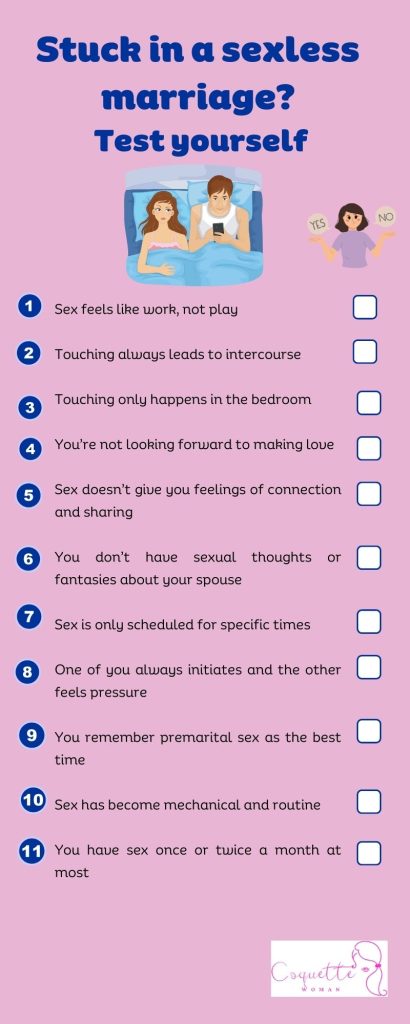Surviving a Sexless Marriage: One Woman’s Story
Marry, a 38-year-old lawyer from New York had always been a successful and driven professional, but her personal life was far from perfect. She had been married for 10 years to her college sweetheart, but their relationship had become increasingly distant and sexless.
At first, Marry had attributed the lack of intimacy in her marriage to the stress and demands of her high-powered job. She and her husband were both working long hours and had little time for each other. But as the years went by, Marry began to realize that the problem ran deeper than that.
Her husband had always been distant and emotionally unavailable, and Marry had grown to accept that as a part of their relationship. But now, the lack of intimacy and connection was taking a toll on her mental and emotional well-being. She felt lonely and unfulfilled, and her self-esteem had taken a hit.
Marry tried to talk to her husband about the problem, but he was dismissive, insisting that everything was fine and that they were just going through a rough patch. Marry knew that wasn’t true, and she couldn’t shake the feeling that her marriage was killing her.
She decided to seek help, and she started seeing a therapist who specialized in couples therapy. Through therapy, Marry learned to communicate more effectively with her husband and to set boundaries in their relationship. But despite her efforts, her husband was unwilling to change, and Marry realized that she couldn’t keep living in a sexless marriage that was slowly killing her. She eventually decided to file for divorce and start a new chapter in her life.
Marry’s story is a reminder that sexless marriages can be incredibly detrimental to one’s mental and emotional well-being, and that it’s important to seek help if you’re struggling in your relationship. Sometimes, no matter how much we try to fix things, the best solution is to move on and find happiness elsewhere.

Stuck in a sexless marriage? Test yourself
A sexless marriage is a living nightmare, robbing you of the joys of a fulfilling relationship.
So, when it comes to sexual problems in American couples, inhibited sexual desire is the real problem. But it’s not just the long-time married couples that are feeling the heat, newlyweds and unmarried couples are feeling the burn too. Don’t let anyone fool you, it ain’t just boredom or old age causing these problems.
We dive into the complex world of low-sex and no-sex marriages, and ask the real questions: what went wrong after the sexual revolution of the 60s and 70s?
How can you understand and tackle inhibited sexual desire in your own relationship?
And for real, are you a freak if you’re in a no-sex marriage?

Take this quick true-false test to see if you’re feeling the heat:
- Sex feels like work, not play.
- Touching always leads to intercourse.
- Touching only happens in the bedroom.
- You’re not looking forward to making love.
- Sex doesn’t give you feelings of connection and sharing.
- You don’t have sexual thoughts or fantasies about your spouse.
- Sex is only scheduled for specific times.
- One of you always initiates and the other feels pressure.
- You remember premarital sex as the best time.
- Sex has become mechanical and routine.
- You have sex once or twice a month at most.
If you answered true to five or more statements, true to item 11, or both, you’re one of the over 40 million Americans stuck in a low-sex or no-sex marriage.
Why marital sexuality is important
A sexless marriage is like a slow suffocation, taking away the air you need to breathe and thrive.
Marital sexuality serves several important functions within a relationship. It allows for physical intimacy and emotional connection between partners, it can strengthen the bond of trust and respect, and it can provide a sense of pleasure and satisfaction. When these functions are not being fulfilled, it can lead to dissatisfaction and strain within the marriage, particularly if the lack of sexual activity becomes chronic. In some cases, the problem may be rooted in a specific issue that can be addressed, such as a medical condition or difficulty communicating about sexual needs. However, in other cases, the lack of sexual activity may be a symptom of deeper underlying issues within the relationship. In either case, addressing the problem is crucial for maintaining a healthy and fulfilling marriage.
Normally, when sex is good, it’s a positive, but minor component adding 15-20% to marital satisfaction. But when it’s dysfunctional or non-existent, it becomes a major issue, taking up 50-70% of the marriage and robbing the relationship of intimacy and vitality.
Inhibited desire is the real game-changer, and if it degenerates into a no-sex or low-sex marriage, it puts a lot of pressure on the couple, especially if affection and sensuality also cease. Desire is the core of sexuality and no-sex and low-sex marriages become devitalized, especially in the first 3 years of marriage. Unless something is done to reverse this process, divorce is a likely outcome.
The functions of marital sexuality are to create shared pleasure, reinforce and deepen intimacy, and use it as a tension-reducer to deal with the stresses of life and marriage. An optional function is to conceive a planned, wanted baby. No-sex and low-sex marriages negate these benefits and rob a couple of special feelings and intimate connections.
Low-sex marriage problems
A sexless marriage is not a marriage at all, it’s a slow death of the soul.
The ultimate struggle in sexual problems is a no-sex marriage. Couples fall into a cycle of anxiety, bad experiences, and eventually, sexual avoidance. Sex becomes more of a chore than a thrill. They didn’t plan for a no-sex marriage, it just happens. A no-sex marriage doesn’t mean “no sex at all”, it means “sex less than 10 times a year”. A low-sex marriage means being sexual less than every other week (i.e., less than 25 times a year). Roughly 20% of married couples have a no-sex relationship, and an additional 15% have a low-sex relationship. One in three non-married couples who have been together more than 2 years has a no-sex relationship.
The longer the couple avoids sexual contact, the harder it is to break the cycle. Avoidance becomes a self-fulfilling trap. The longer the partners are in a low-sex or no-sex marriage, the more they blame each other. The more shameful they feel, the harder it is to break the cycle. The couple that has not resumed sexual contact 6 months after the baby was born faces one set of problems, but the couple that has not been sexual for 6 years faces a more daunting task. The strategy for change is the same, renew intimacy, engage in non-demand pleasuring, and add erotic scenarios and techniques. The more chronic the problem, the more difficult the change process. Maintaining motivation is a major challenge. Confronting avoidance and inhibitions is more difficult for a couple that has stopped being affectionate. The good news is that motivated couples are able to re-establish touching, desire, arousal, and intercourse.”
Unrealistic Expectations about Marital Intimacy
We’ve got more knowledge about sexual function and dysfunction than ever before, but that doesn’t mean we’ve got it all figured out. There’s a ton of info out there, but not all of it is accurate. Society talks about sex all the time, but it’s not always a quality conversation. We’ve traded outdated myths for unrealistic expectations and performance anxiety.
Sexual pleasure is a complex and crucial aspect of life and marriage, and we gotta respect that everyone’s different. There’s no one right way to be sexual. To promote healthy sexuality, we gotta remember that sex is more than just the physical act, it’s also attitudes, feelings, perceptions, and values. And most importantly, it should enhance our lives and relationships.
Sexual dysfunction or dissatisfaction in marriage
The four components of sexual functioning are desire, arousal, orgasm, and satisfaction. When all four are working well, it leads to pleasure for both partners. But it’s important to have realistic expectations and accept that every sexual experience is different. Even in healthy relationships, not every sexual experience is going to be mind-blowing. It’s normal to have occasional differences in desire or lack of desire. And it’s normal for one partner to initiate sex more than the other.
Around 50% of married couples (and over 60% of unmarried couples) experience sexual dysfunction or dissatisfaction. Inhibited sexual desire and discrepancies in desire are the most common complaints. So, you’re not alone in this struggle. It’s normal to occasionally lack desire and it’s healthy to not want to be sexual in times of stress or conflict. But if it becomes a chronic problem, it can put a strain on a relationship.”
“Yo, society has us thinking that romantic love and sexual chemistry are the ultimate keys to a firey and passionate sex life. But in reality, that kind of ‘hot’ sex based on romantic love and passion doesn’t last forever. It’s not what keeps sexual desire alive. It’s all about emotional and sexual intimacy, not just passion.
How to rebuild desire in marriage
A sexless marriage is like living in a desert, parched for intimacy and connection.
Couples often report “hot” sex at the beginning of their relationship, but it can fizzle out when they start living together or getting married.
The way to rebuild desire is to focus on intimacy, enjoying non-demand pleasuring, and creating new and exciting scenarios. It’s not about trying to reignite that initial passion, it’s about building new bridges to desire.
Maintaining comfort, attraction, and trust is an active process, it’s not something that just happens on its own. Both partners have to actively work to make it happen. Change is usually gradual, not dramatic and there will be setbacks, but if they stay committed to the process, they can succeed. Once they’ve reestablished their sexual connection, they have to keep working to maintain it. Neglecting it will just lead to a decline in sexual desire.”
Stop Thinking Divorce Is a Failure
The traditional way of thinking was that all marriages could and should be saved, and divorce was seen as a failure. But that’s not always the case. Some marriages, like those that are abusive or destructive, aren’t worth saving. Even though we’re pro-marriage, sometimes divorce is the healthier option when things are seriously messed up. A marriage that provides intimacy and security is valuable, but when trust and respect are lacking, trying to fix the intimacy is pointless. A sexless or low-sex marriage can make couples feel disconnected, especially if there’s no affection or sensuality. If that doesn’t change or there aren’t other ways to feel fulfilled, the marriage probably won’t survive. Sometimes, marriages might have other good things going for them, but sexual problems can still sink the whole thing.
Difficulties to revive your sexless marriage
This article is meant to help you rekindle your marriage, or at least give you hope and motivation to seek therapy.
But often sexual problems arise because of secrets and hidden agendas that can be difficult to deal with on your own. It’s important to be open and honest, and if you can’t do this with your partner, try talking to a therapist or a close friend. Sometimes hidden agendas can be worked through, but other times they reveal deeper problems in a marriage that cannot be fixed. And then it’s time to think about ending it.
Over time, the sexual problem becomes serious and chronic. Sexual problems undermine marriages, depriving them of intimacy and energy. The sexual problem increasingly defines marriage; accusations and resentment accumulate.
In well-functioning marriages, sexuality plays 15 to 20 percent of the role in terms of vitality and satisfaction. In a chronic problem of repressed desire, sexuality plays an extremely important role, draining positive feelings and tearing the fabric of marriage. Another model is that relationship conflicts, especially those involving anger, are played out through sexual conflict.

Summary
This article discusses the issue of low-sex and no-sex marriages in America and how it can negatively impact a relationship. It highlights the causes of inhibited sexual desire, which can range from medical issues to deeper underlying relationship problems. The article also includes a test to determine if you’re in a low-sex or no-sex marriage and the importance of addressing the problem in order to maintain a healthy and fulfilling marriage. It also states that unless something is done to reverse the process, divorce is a likely outcome. The article also explains that a no-sex marriage is when a couple has sex less than 10 times a year, and a low-sex marriage is when a couple is sexual less than every other week. Roughly 20% of married couples have a no-sex relationship, and an additional 15% have a low-sex relationship. So, you are not alone.
FAQ Section
Question: Why does a sexless marriage hurt so much?
Answer: A sexless marriage can cause deep emotional pain because it denies the fundamental need for intimacy and connection. It goes beyond physical satisfaction—it’s about feeling desired, loved, and emotionally connected to your partner. When that intimacy is absent, it can leave you feeling unimportant, rejected, and profoundly lonely.
Question: When should you give up on a sexless marriage?
Answer: Deciding when to give up on a sexless marriage is a heart-wrenching choice. It’s important to consider factors like ongoing unhappiness, unmet needs, and a lack of effort to address the issue. When you feel a profound sense of disconnection and your emotional well-being is consistently compromised, it may be time to consider your own happiness and consider making a difficult decision.
Question: Is a sexless marriage a reason to leave?
Answer: A sexless marriage can be an agonizing experience, as physical intimacy is a vital part of a loving relationship. It’s crucial to remember that your own happiness and emotional well-being matter. If your needs consistently go unfulfilled, and efforts to resolve the issue have been unsuccessful, it may be a valid reason to consider leaving in search of a relationship that can provide the love, connection, and physical intimacy you deserve.
Question: How many sexless marriages survive?
Answer: The survival rate of sexless marriages varies significantly and depends on numerous factors, including the willingness of both partners to address the issue and work on the relationship. While some marriages can find a way to survive by focusing on emotional connection and other aspects of the relationship, others may struggle to overcome the profound impact of the lack of physical intimacy. Seeking professional help and open communication are crucial in increasing the chances of a sexless marriage surviving.





